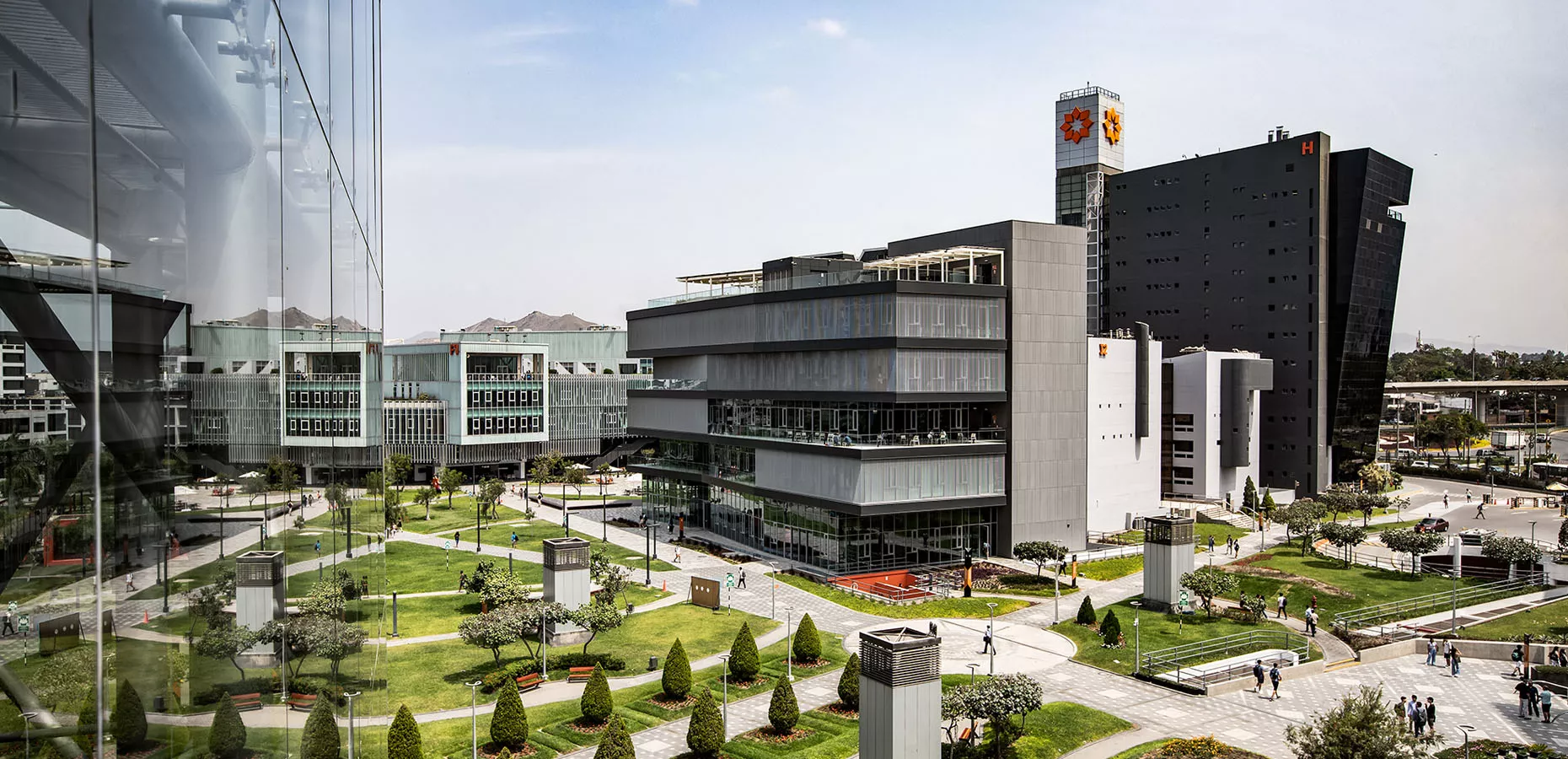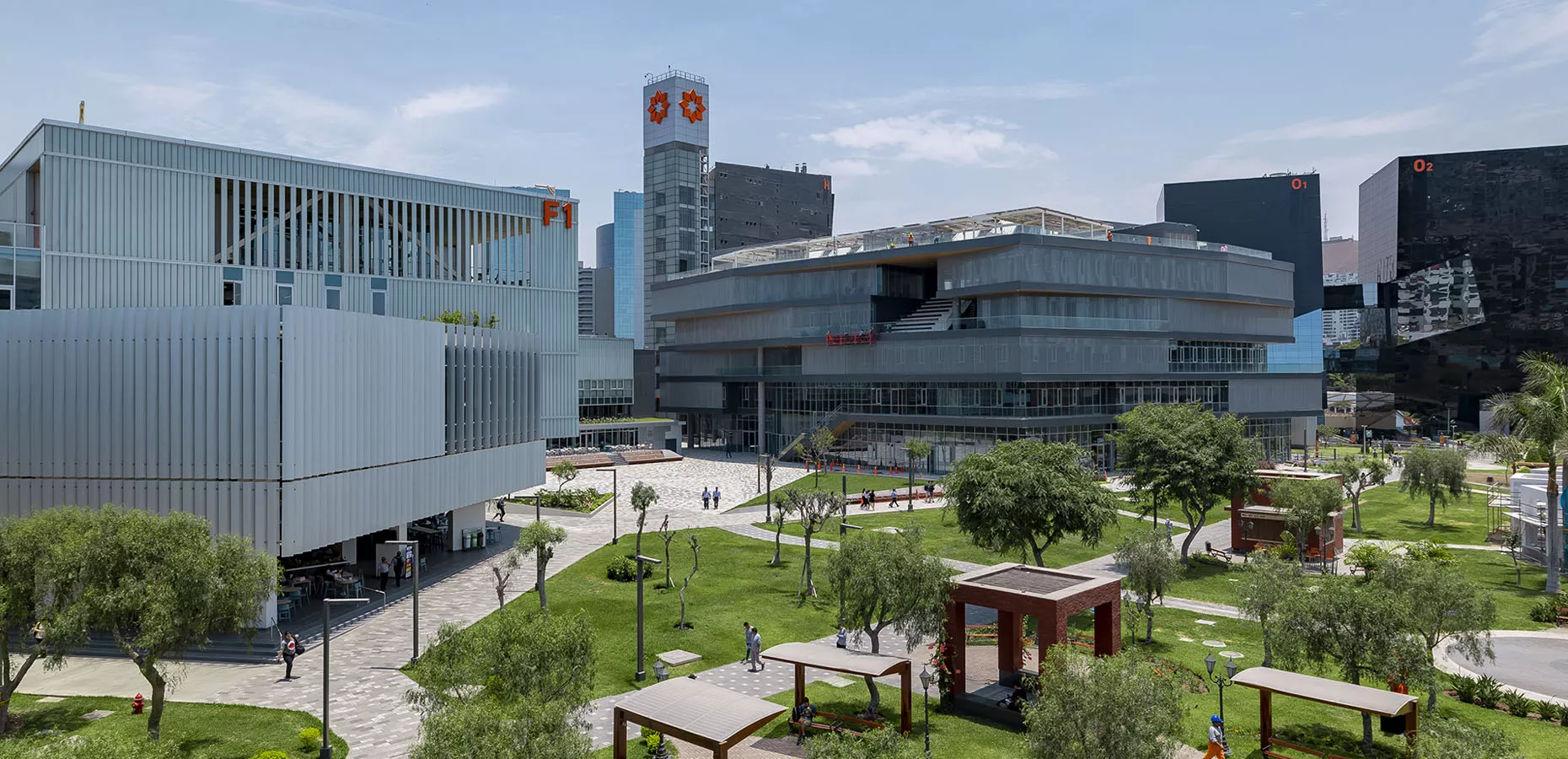Undergraduate
ABOUT
Universidad de Lima has a General Studies Program and 14 undergraduate programs distributed in 6 schools.
GENERAL STUDIES
The General Studies Program is a basic education cycle that provides students with reflection habits and intellectual tools necessary to achieve a competent college culture, whilst discovering the right professional path to pursue according to their interests and competences.
The final goal is to provide Ulima graduates with the right tools to express a logical and rational thinking based on analysis, abstraction, generalization and association, with a solving-problem approach.
UNDERGRADUATE PROGRAMS
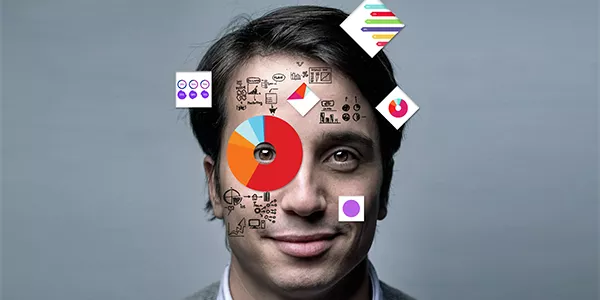
SCHOOL OF BUSINESS
MANAGEMENT
The Management Undergraduate Program trains professionals in business management, equipping them with solid theoretical and practical knowledge. This foundation enables them to lead top-tier organizations in areas such as talent management, operations and international logistics, finance, marketing and commercial management, business innovation, and research. It also prepares them to successfully create, implement, and manage their own business ventures.
Professionals specialized in business management, planning and organization. They drive with social responsibility and multidisciplinary education within an entrepreneurship-based ethical framework.
- Finance and Investment
- Talent Management
- Business Innovation and Information Technology
- Marketing and Consumer Behavior
- International Operations and Logistics
- Digital Transformation
- Corporate Sustainability

SCHOOL OF ARCHITECTURE
ARCHITECTURE
The Architecture Undergraduate Program prepares future architects with a humanistic education, technical expertise and management skills—all grounded in rigorous quality standards. At Universidad de Lima, students have access to specialized spaces where they can explore different materials, build architectural models, and develop project management abilities.
Professionals with construction skills who provide solutions with creativity and social responsibility, generating a positive impact on urban and environmental surroundings.
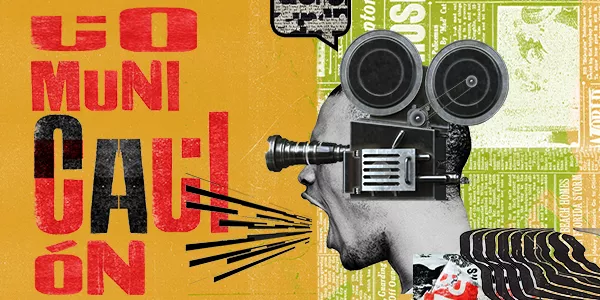
SCHOOL OF COMMUNICATION
COMMUNICATION
The Communication Undergraduate Program—created in 1972 and forerunner nationwide—provides comprehensive training focused on planning and management of communication projects, as well as on development of innovative products with creativity and critical approach. The flexible curriculum allows students to have a bigger picture of this profession and the possibility to choose one or more specializations.
Professionals capable of conducting journalistic endeavors, developing marketing strategies, and preparing advertising plans, as well as designing video games and applications, corporate image and social development programs. Students also have the opportunity to focus on producing high-impact visual content through graphic design and photography.

SCHOOL OF BUSINESS
ACCOUNTING AND FINANCE
The Accounting and Finance Undergraduate Program prepares well-rounded professionals for sectors such as industry, commerce, consulting, and business advisory services. They are known for their proven efficiency in information management and strong decision-making skills in financial management, tax compliance, and internal controls.
Professionals with suitable skills on financial, accounting, tax and control areas. Fully capable of designing, planning, developing and implementing strategic solutions within global environments.

SCHOOL OF LAW
LAW
The Law Undergraduate Program trains professionals with in-depth legal expertise, ready to analyze and apply the law effectively in any scenario. With a strong focus on negotiation, we prepare students to resolve conflicts efficiently—without the need for litigation—aligning with today's global trend toward alternative dispute resolution.
Professionals with in-depth knowledge of legal sciences, prepared to assume leadership roles across diverse sectors and to deliver efficient and ethical solutions.

SCHOOL OF ECONOMICS
ECONOMICS
The Economics Undergraduate Program trains highly skilled professionals to pursue careers in the private or public sectors. In the private sector, our economists will be able to assess and respond to the effects of environmental factors to efficiently allocate economic resources within organizations. This will enable them to effectively address short- and medium-term issues from real-world and financial perspectives. In the public sector, they will be able to provide viable solutions to key challenges related to the country's economic development.
Professionals with a solid and comprehensive background in macroeconomics and microeconomics, proficient in econometric modeling, data science, and financial statement analysis. These competencies enable them to make ethically sound decisions across the public and private sectors, both nationally and internationally. They demonstrate visionary leadership, excel in collaborative environments, and approach challenges through systemic thinking and a commitment to continuous learning.
- Applied Data Science for Economics
- Investment Management
- Economic and Financial Research
- Financial Theory and Stock Markets
- Economic Policy

School of Engineering
ENVIRONMENTAL ENGINEERING
The Environmental Engineering Undergraduate Program trains leaders capable of finding a balance between development and sustainability. The comprehensive approach combines basic sciences, applied engineering and environmental management, allowing professionals to face global challenges such as climate change, circular economy, and ecosystem conservation. Students build skills in advanced technology, environmental legislation and sustainable corporate strategies, working in key sectors to foster competitiveness and environmental responsibility. Supported by modern laboratories and real projects, this program provides students with a practical and transformative education to play a leading role in making the planet more sustainable.
Professionals capable of leading cutting-edge transformation in environmental culture. The theoretical and practical training allows them to identify interactions between productive activities and the environment, in order to devise robust and innovative solutions to design and implement engineering systems that secure the environmental sustainability of processes.
- Conservation and Environmental Health
- Environmental Impact Assessment and Risk Management
- Environmental Management
- Technologies for Environmental Sustainability

SCHOOL OF ENGINEERING
CIVIL ENGINEERING
The Civil Engineering Undergraduate Program strengthens the construction industry, and offers students a solid training in design and construction with great technical soundness. Moreover, students will learn to lead work teams, manage processes and costs, and develop eco-friendly projects that offer creative and innovative responses to the global construction sector.
Graduates from the Civil Engineer Program stands out for their comprehensive approach and innovative capacity to solve problems in the construction sector. With a solid background in science, engineering, research and management—combined with a collaborative and multidisciplinary perspective—they leverage Information and Communication Technologies (ICT) to manage infrastructure projects in an efficient and sustainable manner throughout the entire asset life cycle. Their commitment to excellence is reflected in the ability to consider technical, global and social aspects in the design and implementation of projects, ensuring a positive impact on the community.
Student Outcomes (SO) describe the competencies that a Civil Engineering student develops during their academic training. Below are each of the skills:
- SO1: An ability to identify, formulate, and solve complex engineering problems by applying principles of engineering, science, and mathematics.
- SO2: An ability to apply engineering design to produce solutions that meet specified needs with consideration of public health, safety, and welfare, as well as global, cultural, social, environmental, and economic factors.
- SO3: An ability to communicate effectively with a range of audiences.
- SO4: An ability to recognize ethical and professional responsibilities in engineering situations and make informed judgments, which must consider the impact of engineering solutions in global, economic, environmental, and societal contexts.
- SO5: An ability to function effectively on a team whose members together provide leadership, create a collaborative and inclusive environment, establish goals, plan tasks, and meet objectives.
- SO6: An ability to develop and conduct appropriate experimentation, analyze and interpret data, and use engineering judgment to draw conclusions.
- SO7: An ability to acquire and apply new knowledge as needed, using appropriate learning strategies.
The Program Educational Objectives (PEO) outline the key milestones every civil engineering professional must achieve, based on insights from employers, alumni, faculty, and students.
A graduate from Universidad de Lima in Civil Engineering achieves the following:
- PEO 1: Mastering technical skills for planning, analyzing, designing, constructing, supervising, operating, and maintaining infrastructures.
- PEO 2: Excelling in project management, teamwork, and leveraging ICT to provide valid, creative, innovative, and sustainable technical solutions for the efficient management of infrastructure projects.
- PEO 3: Leading with confidence and communicating effectively within multidisciplinary teams during all phases of infrastructure project management.
- PEO 4: Committing to lifelong learning and harnessing the latest technologies in infrastructure management.
- PEO 5: Innovating and researching to meet engineering challenges with a focus on continuous improvement.
- PEO 6: Practicing with a strong ethical foundation and social responsibility to drive sustainable development in both organizations and communities.

SCHOOL OF ENGINEERING
INDUSTRIAL ENGINEERING
The Industrial Engineering Undergraduate Program trains professionals who foster a culture of quality and constantly seek opportunities for improvement within organizations. Our industrial engineers have the skills to design, implement, manage, and improve production processes for goods and services. Thus, they are committed to business competitiveness and profitability.
Professionals capable of developing, analyzing, evaluating and optimizing business projects, and identifying areas for business opportunities through production processes of goods and services.
- Business Analytics
- Engineering Project Management
- Business Engineering
- Technological Innovation
- Supply Chain Management

SCHOOL OF ENGINEERING
SYSTEMS ENGINEERING
The Systems Engineering Undergraduate Program trains skilled professionals to meet organizational challenges and demands by integrating business processes and developing, implementing, and managing IT solutions.
Professionals equipped to meet organizational challenges on a global scale. Taking a holistic approach, they develop and manage groundbreaking IT solutions to foster innovation and efficiency across industries.

SCHOOL OF ENGINEERING
MECHATRONICS ENGINEERING
The Mechatronics Engineering Undergraduate Program trains well-rounded professionals capable of revolutionizing the industry by incorporating advanced techs such as robotics, automation, and AI. Our graduates design and implement automatic systems that improve both competitiveness and efficiency in different productive sectors. They combine mechanics, electronics, and control in order to devise innovative and sustainable solutions—leading not only the technological progress but also bolstering the future of smart systems.
Professionals capable of designing, simulating, developing, and integrating state-of-the-art machines and automatic systems. Their theoretical and practical knowledge allows them to innovate productive processes through synergies in mechanics, electronics, programming, and control, in order to contribute toward organizational competitiveness.
- Automation and Industrial Robotics
- Technological Innovation
- Simulation and Cyber Physical Systems

SCHOOL OF BUSINESS
MARKETING
The Marketing Undergraduate Program prepares students to lead innovation processes, create unique value, develop brands and new markets, and make strategic decisions in their own ventures or within external organizations. Our graduates receive modern training in marketing and customer management, with emphasis on evidence-based decision-making. Additionally, we foster the development of cross-cutting managerial skills.
Professionals with ethics, global leadership skills and great capacity to manage processes around innovation, value creation, marketing and business management.
- Data Science and Machine Learning
- Commercialization and Trade Marketing
- Entrepreneurship in Sports Marketing and Sponsorship
- Entrepreneurship in Innovation and Technology Marketing
- Strategic Brand Management
- Market Research and Consumer Behavior
- Digital Marketing

SCHOOL OF BUSINESS
INTERNATIONAL BUSINESS
The International Business Undergraduate Program equips professionals with the theoretical and practical knowledge needed for global business management, modern financing mechanisms, and innovative trade tools required by the global market.
Professionals with a strategic vision skilled in competitive and successful international insertion who master modern financing mechanisms and new trading instruments required by the global market.
- International Market Intelligence
- International Finance
- International Trade Logistics
- International Relations
- Sustainability and International Strategies

SCHOOL OF PSYCHOLOGY
PSYCHOLOGY
The Psychology Undergraduate Program offers up-to-date theoretical and practical training that prepares students to work effectively in clinical, educational, and organizational settings. Its methodology fosters the development of diagnostic and intervention skills, both individual and group-based. Graduates are committed to service, respect, and a genuine interest in people, enabling them to understand and explain behavior and mental processes. The program also provides strategies to predict behavior and intervene in ways that support individuals' development and well-being across various areas of life.
Professionals with a solid understanding of the psychological processes behind human behavior across diverse contexts. They are capable of designing and applying techniques to address behavioral challenges at both the individual and group level.
INFRASTRUCTURE
LEARN MORE ABOUT ULIMA
We balance study with extracurricular activities that nurture college life. Therefore, we offer different activities for our Ulima community.
CENTER FOR EMPLOYABILITY, PROFESSIONAL ENGAGEMENT, AND ALUMNI
Since 1965, Universidad de Lima maintains contact with main companies, organizations and institutions nationwide to train students in science and practice. This training process has allowed us to position in the labor market as leaders in training. Throughout the years, we have adapted our academic proposal to the emerging needs of the labor market, which has resulted in an integral professional development model that fosters employability of our students and graduates (undergraduate and graduate programs), in a complementary manner to our Ulima job pool.
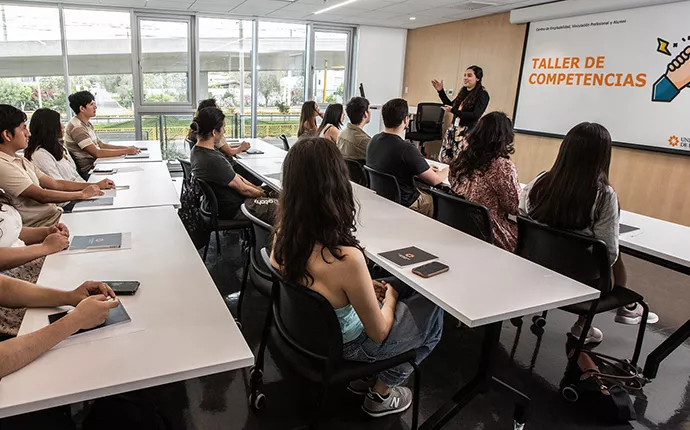
CENTER FOR ENTREPRENEURSHIP
Based on a comprehensive support model, the Center for Entrepreneurship carries out awareness activities to promote an entrepreneurial culture. Moreover, it provides specialized and customized academic advising from professionals experts in business creation, design, and incubation through different programs and competitions. Premises of the Center for Entrepreneurship are available to all Ulima entrepreneurs, whether students or graduates:
- Coworking area
- Incubation offices
- Multipurpose room for workshops
- Meeting rooms
- Administrative area

ARTISTIC WORKSHOPS
The Department of Artistic Activities offers Ulima students and graduates the chance to build their artistic skills through free workshops in charge of renowned professors.
ARTISTIC EXPRESSION AT ULIMA
Build your artistic skills thanks to free workshops. Participate in the University Week along with students from all faculties.
ARTISTIC WORKSHOPS
Designed for the progressive learning of the artistic activity. Here, you will find different schedules for basic, intermediate and advanced levels. You can actively participate in different activities representing the University.

STUDY CIRCLES
Study Circles are groups of students from different undergraduate programs with a common interest. They have the academic advising of a faculty advisor and are framed in a specific undergraduate program.

CULTURAL CENTER
The Cultural Center is a creative space for meeting and enjoyment of multidisciplinary, modern, and innovative artistic experiences, where people embrace and disseminate cultural projects that make us think about our human condition in this world. We invite you to discover our different platforms, where you can actively participate in the exchange and creation of new contents and innovative proposals.

SUSTAINABILITY CENTER
The Sustainability Center (Responde Ulima) manages strategic projects that contribute towards the fight against poverty, environment protection, and respect for diversity.

STUDY CIRCLES
Study Circles are groups of students from different undergraduate programs with a common interest. They have the academic advising of a faculty advisor and are framed in a specific undergraduate program.
Consortium of Universities
The Consortium of Universities is a non-profit civil organization comprising Pontificia Universidad Católica del Perú, Universidad del Pacífico, Universidad Peruana Cayetano Heredia and Universidad de Lima. Since its creation in 1996, the goal has been joining the individual efforts of its four member universities in order to bolster joint actions towards the country's development.
Auditor Students
Auditors are students who do not follow the ordinary admission procedure and are authorized by the Admission Committee to register for courses given at Universidad de Lima. Students who are currently registered in other university or who have completed their university studies and want to temporarily complement them at Universidad de Lima may register as auditors in the undergraduate programs.
